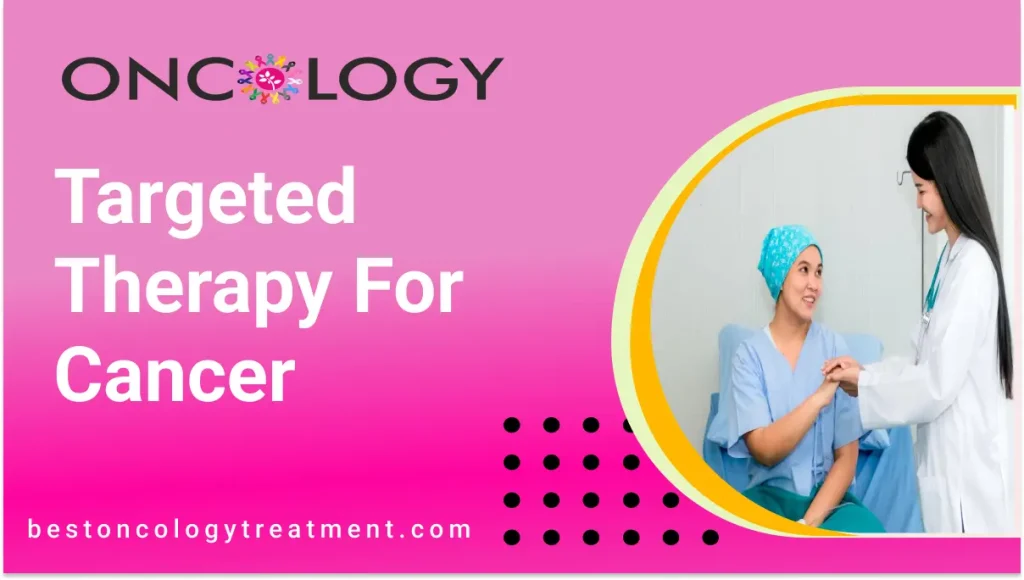Targeted Therapy For Cancer is transforming the landscape of oncology by offering more precise and effective treatment options. This innovative approach focuses on targeting specific molecules involved in the growth and spread of cancer cells, thereby minimizing damage to healthy tissues. In this blog post, we will delve into the principles of targeted therapy, its benefits, and specific applications, including Targeted Therapy In Chennai and Targeted Radiation Therapy.
What is Targeted Therapy For Cancer?
Targeted therapy for cancer is a type of treatment that uses drugs or other substances to identify and attack cancer cells while sparing normal cells. This method targets the molecular and genetic alterations that are unique to cancer cells, providing a more tailored approach to treatment compared to traditional chemotherapy.
Mechanisms of Targeted Therapy
Targeted Therapy In Oncology employs various mechanisms to fight cancer, including:
- Monoclonal Antibodies: These are designed to bind to specific targets on cancer cells, marking them for destruction by the immune system.
- Small Molecule Inhibitors: These drugs block the enzymes and proteins that cancer cells need to grow.
- Signal Transduction Inhibitors: These inhibit the signals that promote cancer cell division and survival.
Benefits of Targeted Therapy
Targeted therapy offers several advantages over traditional treatments, such as:
- Precision: By focusing on specific molecular targets, these therapies are more effective and less harmful to normal cells.
- Fewer Side Effects: Patients often experience fewer and less severe side effects compared to chemotherapy.
- Personalized Treatment: Therapies can be tailored to the genetic profile of the individual’s cancer.
Applications of Targeted Therapy For Cancer
Targeted therapy is used to treat various types of cancer, each requiring different approaches and drugs.
Breast Cancer
In breast cancer, targeted therapy drugs like Trastuzumab (Herceptin) and Pertuzumab target the HER2 protein, which promotes the growth of cancer cells.
Lung Cancer
Drugs like Erlotinib and Crizotinib are used to target specific mutations in lung cancer cells, providing a more effective treatment option for patients with these genetic alterations.
Leukemia
In leukemia, targeted therapy drugs such as Imatinib (Gleevec) block the BCR-ABL protein, which causes cancer cell growth.
Targeted Therapy In Oncology
Targeted Therapy In Oncology represents a significant advancement in cancer treatment, focusing on the genetic and molecular basis of cancer. Oncologists use comprehensive genomic testing to identify specific targets for therapy, allowing for more personalized and effective treatment plans.
Genetic Profiling
Before starting targeted therapy, genetic profiling of the tumor is often conducted. This process helps in identifying mutations and alterations that can be targeted by specific drugs.
Combination Therapies
Combining targeted therapy with other treatments, such as chemotherapy or immunotherapy treatment, can enhance the overall effectiveness and help in overcoming resistance to single-drug treatments.
Targeted Therapy In Chennai
Targeted Therapy In Chennai has seen significant growth, with several leading hospitals and research centers offering advanced treatment options. Chennai is becoming a hub for cutting-edge cancer treatment due to its state-of-the-art facilities and highly skilled oncologists.
Leading Hospitals
Prominent hospitals in Chennai, such as Apollo Hospitals and Fortis Malar Hospital, provide comprehensive cancer care, including targeted therapy. These institutions are equipped with the latest technology and staffed by experts in oncology.
Clinical Trials
Chennai is also a site for numerous clinical trials, providing patients with access to the latest targeted therapy treatments and contributing to the global research efforts in oncology.
Targeted Radiation Therapy
Targeted Radiation Therapy is a specialized form of radiation therapy that focuses on delivering radiation precisely to the tumor site while minimizing exposure to surrounding healthy tissues. This technique is particularly useful in treating localized tumors.
Types of Targeted Radiation Therapy
- Stereotactic Body Radiotherapy (SBRT): Delivers high doses of radiation to small, well-defined tumors in the body.
- Intensity-Modulated Radiation Therapy (IMRT): Utilizes sophisticated technology to adjust photon and proton beams precisely, matching the contours of the tumor.
- Proton Therapy: Uses protons instead of x-rays to treat cancer, allowing for more precise targeting of tumors with less damage to nearby healthy tissues.
Benefits of Targeted Radiation Therapy
- Precision: Enhanced targeting of tumors reduces damage to surrounding healthy tissues.
- Effectiveness: Higher doses of radiation can be delivered directly to the tumor, improving treatment outcomes.
- Reduced Side Effects: Patients experience fewer side effects compared to conventional radiation therapy.
Conclusion
Targeted Therapy For Cancer is revolutionizing the way we approach cancer treatment, offering a more precise, effective, and personalized option for patients. With advancements in Targeted Therapy In Oncology and the growing accessibility of Targeted Therapy In Chennai, more patients can benefit from these innovative treatments. Additionally, Targeted Radiation Therapy provides a valuable tool in the fight against cancer, further enhancing the precision and effectiveness of cancer care. As research progresses, the future of cancer treatment becomes increasingly hopeful.

